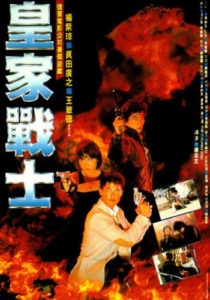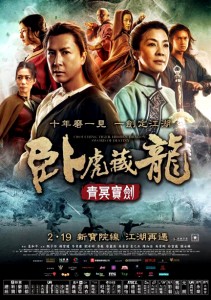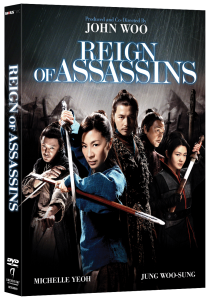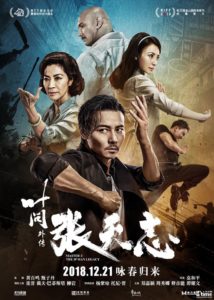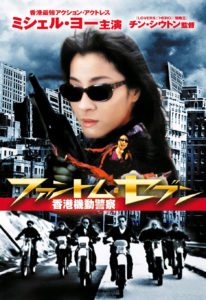Director: Ang Lee
Writer: Hui Ling Wang, Kuo Jung Tsai, James Schamus, Kuo-Rong Tsai, Wang Hui Ling
Cast: Zhang Ziyi, Michelle Yeoh, Chow Yun Fat, Chang Chen, Cheng Pei Pei, Lung Sihung, Betty Huang Yi
Running Time: 115 min.
By Numskull
Pretty much everything that has been said about this movie is true.
The cast is superb. Chow Yun-Fat, who gets top billing, turns in a fine performance as usual but actually has a smaller role than his female co-stars, Michelle Yeoh and Zhang Ziyi. Yeoh is great as an middle-aged female warrior weary of the travelling lifestyle, and I was most pleased to see that she didn’t get dolled up too much to make her look younger (and therefore sexier to Studio Joe) than she really is (don’t take that as a slam on her, as I have more respect for her than for any pair of big tits posing as an actress that you can name). New kid on the block Zhang Ziyi has immense screen presence and, quite frankly, steals the show. You can’t take your eyes off her. She displays a vast scope of talent in one role played to perfection; she portrays multiple facets of Jen’s personality, from the sweet and innocent girl next door to the troubled loner with the mysterious secret to (most memorably) the cocky little bitch who stops at nothing to get what she wants. If there is any justice in this world, she’ll be a mega-star.
The story, despite the presence of a few cliches which most of us have seen before, is also very well done. Yes, Li Mu Bai wants to avenge his murdered master; yes, Jen is the unfulfilled daughter of a wealthy man who doesn’t want to go through with an arranged marriage; and yes, Lo is the thief with the heart of gold who falls for the rich and dignified princess type. But never mind that. Those points may be familiar but the plot’s progression is something else.
The visuals are very impressive indeed. Images of the overcrowded city streets that China is known for in this day and age are juxtaposed with sweeping shots of harsh deserts and wild forests, enforcing the idea that even the greatest fighter and the wealthiest nobleman was at the mercy of Mother Nature to some degree “way back then”.
The soundtrack is quite fitting, with the ethnic tones having a very strong presence while not being so abrasive to Joe Average with his Eminem and Jane Typical with her Backstreet Boys that they’re likely to cover their ears.
The subtitles, as far as I could tell, are flawless. I did not spot a single grammatical error. The only problem is that this probably cuts into the film’s profitability, as the average American hardly ever reads anything requiring a longer attention span than a bumper sticker.
The fighting (which, let’s face it, is the biggest reason why lots of people, myself included, watched or want to watch this movie in the first place) is magnificent. They’ve got that super-hero mentality where people can jump 30 feet in the air, but it’s all done smoothly. In particular, the two duels between Michelle Yeoh and Zhang Ziyi are so jaw-dropping that you’ll never be quite as impressed with the action in most other movies again. After watching these two ladies go at it with such frenetic energy yet so much grace and fluidity at the same time, I wished, for the first time in my life, that standing ovations were permitted in movie theaters.
Now, with all of that having been said, I have some gripes with this movie. They weren’t nearly enough to keep me from enjoying it but they’re substantial enough to put here. First, the treetop battle. Chow Yun-Fat and Zhang Ziyi engaging in a fight-chase hybrid while leaping from treetop to treetop may sound like a cool idea, but it looks ridiculous. There’s a line between poetic visual fantasy and cartoon super-hero fantasy, and this scene definitely crosses it. Still, the movie as a whole is so good I almost felt guilty for snickering. Also, there is no final fight at the end. In a straightforward martial arts action movie this would be unforgivable, but CTHD is really a drama with the battles serving as plot points rather than gratuitous eye candy, so it isn’t as big a deal. The final result of this drawback is that Li Mu Bai’s revenge is not of the most satisfying variety.
Somebody somewhere has surely referred to this as “a martial arts chick flick”. This is not entirely unfair, as a pivotal part of the story is the doomed romance between Jen and Lo, which may or may not make you think “Get on with it, for fuck’s sake”, but that is just too bland a categorization to do this movie justice. It deserves better than to be pigeonholed as a faggy art-house film. Watch it with an open mind and I think you’ll agree.
Numskull’s Rating: 8/10
By Vic Nguen
“One of the greatest movies ever made!”
- Joel Siegel, Good Morning America
“The most exhilarating martial arts movie I have ever seen.”
- Roger Ebert, Chicago Sun Times
“A work of astonishing originality.”
- The Wolf, Inside Out Film
“This film was so great that I literally shit my pants, and the excruciatingly horrific smell, along with the sheer brilliant greatness of the film, brought tears to my eye!”
- Random movie goer quoted at an overpriced multiplex; Fucktown Virginia
Okay, so that last quote may have been derived from my own twisted mind, but I concocted that obscenity-laden tripe for a reason. I’ll admit, CTHD is a good film (especially when compared to most of the shit Hollywood big-whigs shove down America’s collective movie-going asscrack (can’t remember if that was a Numskull quote, oh well, subconscious plagiarism isn’t really plagiarism)), but to go as far as to say that it is the greatest movie of all-time, that’s pushing it. I went into the movie theater with all the hype and hoopla stuck in my mind, and when I left, I found myself asking the question, “so that was it?” Now that I think about it, I probably would have liked the film a lot more if it wasn’t for the fuckin media overkill. Then again, I’ll probably end up going off into another one of my “FUCK HOLLYWOOD” tangents, so let’s discuss the actual film, shall we.
Most of you guys know the plot synopsis, so I won’t waste your time with it. First things first, the singular aspect that impressed me the most from this film is definitely the cinematography. Peter Pau, as far as I’m concerned, is one of the best cinematographers working in the film industry today. He can master and adapt to any genre at a moments notice (just take a look at his subtle work in Anna Magdalena, and juxtapose that to his inventive genius in The Phantom Lover, and you’ll see what I mean). His work on CTHD is no different. The film is filled to the brim with painstakingly elaborate compositions that are picturesque and beautiful. The scenes that take place in the desert flashback definitely come to mind. Another great thing about Pau’s work in CTHD is the fact that he knows how to film a fight scene. Take a look at all the fight-flicks that Hollywood churns out today, and you’ll notice that ALL of the fight scenes are shot so close that it is impossible to appreciate the actors true skills. You won’t see any of that crap in CTHD, however (or any other competent martial arts film, for that matter). Pau utilizes wide shots, which, along with conservative editing, makes CTHD’s fight scenes all the more exhilarating then compared to say, Romeo Must Die (or Rush Hour, or Lethal Weapon 4, or Mortal Kombat, or Shanghai Noon, yada yada yada….) Pau’s win at this years Academy Awards finally gave him the international recognition that he deserves, and hopefully he’ll get better work in the future, instead of making more shit like Dracula 2001.
When you’ve got a cast that includes Chow Yun-fat, Michelle Yeoh, Zhang Ziyi, Chang Chen, and the legendary Cheng Pei-pei, you know that acting wasn’t a major concern for the filmmakers. Chow Yun-fat, as always, gives a noteworthy performance as the aging martial arts master. I agree that he appeared awkward in many scenes with copious amounts of dialogue, but I’ll let it slide since Mandarin isn’t his native language, and because he’s Chow fucking Yun-fat. Michelle Yeoh doesn’t wear any skin tight leather in this one, but she still really hot for a character that’s supposed to be an aging hag. Oh yeah, and she gives a good performance as well, especially considering since, like Chow Yun-fat, Mandarin is not her native language. Zhang Ziyi (who could easily pass off as Gong Li’s younger sister) is now one of the hottest commodities in Hollywood, based solely on the strength of this film. It’s easy to see why. She’s got great screen presence, and she handles her vast amount of screen time with confidence and ease. Can’t wait to see her in Rush Hour 2. Chang Chen was quite good in Wong Kar-wai’s Happy Together, and he handles his role in CTHD well enough. Looks to me like he will be another one of those stars “on the rise” (better if it’s him, and not some talentless hack like Edison Chan, who stunk up Gen-Y Cops, which was a piece of horse manure by the way). Cheng Pei-pei starred in one of my personal favorite films (Come Drink With Me), so her turn as the evil-martial-arts-master-filled-with-vengeance brought me back to the days of King Hu (who obviously influenced Ang Lee, and whose films are infinitely superior; seek out A Touch of Zen if you got the chance.)
Of course, a vast majority of the people that contributed to the $200 million+ box office gross could give a dingo’s dick about storyline, acting, cinematography, etc. What they wanted was pure, adrenaline pumping wire fu. So how were the fight scenes, you ask? Good, to say the least, but nothing I haven’t seen before. Call me crazy, but I can think of about a dozen or so other fight scenes that I’d prefer over the ones in CTHD. Maybe it’s that hard-bitten, cynical-elitist side of me speaking, but face it, the fight scenes in CTHD are not the “be-all, end-all” as far as kung fu flicks go. Yuen Woo-ping has done a lot better (with the exception of The Matrix, I just couldn’t get past Keanu and his pseudo-Bruce Lee impersonation). Despite the bitter ranting, I can honestly say that Michelle vs. Zhang Zhiyi in the dojo was loads of fun. Plenty of aggressiveness and athleticism on display there. Their opening chase/fight was good, albeit a bit anti-climactic. The much talked about bamboo forest scene is a tad disappointing as far as fight scenes go, but the cinematography was astounding the entire way. There are others peppered throughout the film, but they were nothing to write home about (although the restaurant scene had some good laughs). The entire wire-fu thing has sharply divided many viewers. Either you love it or hate it. I personally love wire fu, that is, if it’s done right. The wire fu in CTHD is executed well enough, but appears stilted and shoddy when compared to superior efforts.
Hmm, what else have I yet to discuss (assuming you have been reading the entire way through). Oh yes, Tan Dun’s wonderful musical score provides the perfect complement to the films melancholy tone. Occasionally haunting and very elaborate, it is a job well done (thank god there aren’t any grating rap interludes). I could have done without the sappy pop-stylings of Coco Lee though, but its a minor quibble since she only has one song throughout the entire film. The editing by Tim Squyres allows CTHD to develop at a slow, VERY deliberate pace that works well for this type of film. So those of you who grew up nurtured by the evils of MTV, this isn’t the film for you (assuming, of course, that you have the attention spans of an acorn, which is probably the vast majority). Ang Lee’s direction has been endlessly discussed and praised by film critics everywhere, so I have no real incites regarding the subject. But if someone refers to the fuckin movie as “Sense and Sensibility with kung fu” again, I swear there will be hell to pay.
Anyway, with that out of my system, let’s get down to some closing thoughts. I am ecstatic that CTHD has been a mega-success worldwide, because that could only lead to increased exposure of not just martial arts films, but Asian cinema in general. In the last couple of months, films that Hollywood studios would usually ignore are now getting picked up for US distribution (ie- Stephen Chow’s Shaolin Soccer and The King of Comedy). Yes, there is the possibility that these films will be butchered and dubbed (ie-every single non-US Jackie Chan flick), but there is also the inherent possibility that these films will be released subtitled and uncut (ie-Gen X Cops, Miracles, Takeshi Kitano films, etc.). No, CTHD is not the best film of all time, but hopefully it will inspire others to further explore a genre brimming with better films.
Vic Nguyen’s Rating: 8/10
By David Reiffer
All the super positive reviews for this movie simply amazed me. Don’t get me wrong, this is a ground-breaking film. Action movies will never be the same. But I couldn’t believe such praise was laid upon a kung fu movie. I rarely take seriously the criticism of kung fu movies. Many because I believe its impact depends on the “WOW! Fact or” of its contents.
After seeing this movie, no, living this movie, I can understand the hype which is all very well deserved. There was great acting by all the principle characters and mind-blowing action along the way. After successful releases such as The Matrix and this film, mainstream movies with never be the same.
David Reiffer’s Rating: 9.5/10
By Klotera
First off – this is NOT an HK martial arts movie. Don’t expect it to be like one. This is not Fist of Legend, Drunken Master II, or Iron Monkey. What is it? A beautiful character based story rolled into a unique martial arts film experience. Much in the vein of Ang Lee’s earlier “Eat Drink Man Woman” (another brilliant movie), this film is about the characters, their situations, how the deal with their situations, and how all their situations come together to affect the others.
In this, Ang Lee’s new masterpiece succeeds just as much as that earlier effort. This is combined with a beautiful setting, featuring amazing locales, cinematography, and score. Martial arts sequences are beautifully choreographed by Yuen Woo Ping who manages to really make the fights fit in perfectly with the style of the film. There are plenty of wires, but the fighting itself is more grounded than your average wire-fu. While it isn’t quite Fist of Legend, the martial arts here are quite memorable, particularly the Yeoh/Zhang fight in the armory.
Performances all around are great, with Zhang Ziyi’s confused and angry character stealing the show. The somewhat forced Mandarin of Chow and Yeoh may be a slight point of controversy (much less so for those of us who don’t speak Mandarin) – but it doesn’t change the fact that you can see the emotion in their faces and in their actions. Some people say this movie is overrated. As a martial arts movie, maybe. As a film overall – no way. This character based film is engaging and unforgettable. It is the perfect way for Ang Lee to pay tribute to the martial arts and wuxia stories he loves. Truly one of the best movies I have ever seen and one of only a handful that would get a 10/10 from me (the other couple being domestic films).
Klotera’s Rating: 10/10
By James H.
From the very first shot until the very end of the credits, I was glued to the edge of my seat, with my eyes glued to the screen in front. I watched for 120 minutes, this epic story of love, honour, freedom and revenge.
The complex story follows the search for the Green Destiny sword. Retiring warrior Li Mu Bai (a simply phenomenal Chow Yun-Fat), gives his sword as a gift. However, the sword is stolen by a mischievous young martial artist Jen (the gorgeous Zhang Ziyi, who will be in “Rush Hour 2″). Li Mu Bai’s close friend, fellow warrior, and object of his affection, Yu Shu Lien (a marvelous Michelle Yeoh), then vows to get it back. Watching this story unfold is one of the most exciting things one will ever see.
The acting is above top-notch. I was absorbed by every facial expression and every movement. Normally, when you watch a film with Chow Yun-Fat, it’s always Chow Yun-Fat as so-and-so. But in “Crouching Tiger”, the character absorbs Yun-Fat, and you forget that it is him.
However, the film belongs to Michelle Yeoh and new-comer Zhang Ziyi. When they take the screen, they leap off of it. Both command enormous screen presence, and could easily carry this film on their own.
As well, this film could have easily collapsed under the weight of the complex story and the actors, but director Ang Lee superbly manages to gracefully holds everything together, and keeps the film at a lightening pace.
Also, Lee creates easily some of the most awe-inspiring fight scenes ever committed to celluloid. Forget “Police Story”, forget “Fist of Legend” and forget “Drunken Master 2″. They are nothing compared with this film. Yeoh and Ziyi move with grace and fury; they are unbelievable.
The year 2000 has been an abysmal one for filmgoers. We watched all summer, month after month, as mediocre films came and went leaving little impact. Not only is “Crouching Tiger, Hidden Dragon” the best film of the year, it will leave an impact on filmgoers for several years to come.
James H’s Rating: 10/10
By Retter
Crouching Tiger, Hidden Dragon” stars Chow Yun Fat as a retiring warrior called Li Mu Bai who is giving up his prized sword to a master. He has come from a period of meditation, which he found disturbing, and wants to put his warrior days behind him. He is co-stared by Michelle Yeo who plays Yu Shu Lien, an equally gifted warrior in martial arts, who once was in love with the brother of Li Mu Bai, but he was killed in battle. She now has feelings for Li but won’t show them to him in respect for his brother. Li, after giving his priceless sword to a master and close friend, finds the sword is stolen by the beautiful Jen played by Zhang Ziyi. Li must get the sword back, and he is aided in his quest for what is right, by Yu Shu Lien. Zhang is a student of Jade Fox ,a ruthless martial artist who is known for her stealing of a secret martial arts manual, and the murder of Li’s former Master.
With these main characters, and also Zhang Ziyi’s true love interest, unfolds a truly engrossing story which although is long travels at a lightening pace. The acting by all the leads is brilliant, and all the supporting cast are flawless. The story is complicated but is easy to follow, with Ang Lee showing the world what a great director he is. The cinematography is brilliant especially in the beautiful natural surroundings where the film’s characters often are. The plot is excellently constructed and all the characters are well developed. The films music score has a variety of classic chinese music pieces, and are often emotionally stirring, and add to the films authentic atmosphere. The film settings are beautifully colorful and very realistic for the time period the film tries to replicate.
Just the things I have said so far are reasons to go and watch this film, but it is all topped off by amazingly choreographed fight scenes, which are furious and dazzlingly over the top. These fight scenes were directed by Yuen Wo Ping who is famous for his work on “The Matrix”, but “Crouching Tiger, Hidden Dragon” is a far superior film in every aspect. I was highly impressed by And Lee’s direction because he blended classic story telling with jaw dropping action to produce one very entertaining film. The use of “wires” was brilliant in this film, where warriors can fly from rooftop to rooftop. This is a great example of excellent world cinema which is hugely vibrant, fresh, and acclaimed by both critics and audiences.
If you only see one foreign movie this year, make sure you see “Crouching Tiger, Hidden Dragon”, because it is such an outstanding film which is guaranteed to satisfy.
Retter’s Rating: 9/10 (I can’t give any film ten because there can always be room for improvement although this is near perfect)









